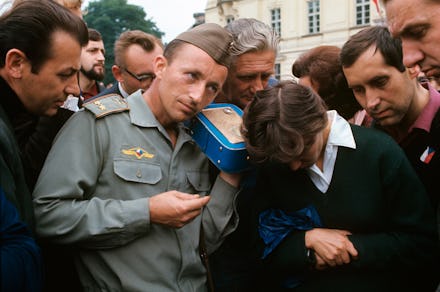7 Powerful Moments When Music Triumphed Over Censorship

John Lennon once said, "Music is everybody's possession. It's only publishers who think that people own it." But publishers aren't the only ones who limit people's access to music.
It's all too rare to have the kind of access to art that U.S. citizens only sometimes have. Though countless governments around the world have made valiant efforts to prevent certain sounds from hitting the airwaves, it's always inspiring to see how a love for music persists in face of the obstacles. Here are seven times music triumphed over censorship — seven times people proved that we can't live without music.
1. N.W.A. overcame a heavy Australian radio ban.
Six months after N.W.A. released the protest anthem "Fuck Tha Police," the Australian Broadcasting Corporation in 1989 banned the song nationwide. In protest, one radio station called Triple J went on strike, leaving the office with N.W.A.'s "Express Yourself" playing on repeat for 24 hours straight (approximately 360 times in a row).
2. Neil Young's classic protest song destroyed American censorship.
While many were at a loss for words after four unarmed Kent State University students were shot to death by the Ohio National Guard on May 4, 1970, for protesting Richard Nixon's Cambodian Campaign, one rock group composed a song that forever shaped our understanding of the events. Crosby, Stills, Nash and Young's "Ohio" was quickly banned on local radio stations by Ohio Gov. James Rhodes, which only served to increase the song's popularity, launching it to No. 14 on the Billboard Hot 100.
If there's one way to make sure something is popular in America, make it forbidden.
3. Stevie Wonder's anti-apartheid politics ruled the airwaves in South Africa.
While accepting the Oscar for his thoroughly innocuous song "I Just Called to Say I Love You" in 1985 (which won Best Original Song for the film The Woman in Red), Stevie Wonder mentioned Nelson Mandela, who was then imprisoned in South Africa. The next morning, the New York Times explained that he was "a black prisoner in South Africa, which upholds a policy of white minority rule called apartheid," bringing more awareness to the conflict in South Africa.
Wonder's music was banned in the country until six months later. As soon as the ban was lifted, the government-owned South African Broadcasting Corporation played his latest single, "Part-Time Lover," on all of its airwaves to celebrate the artist's "transcultural appeal."
4. Jazz couldn't be suppressed in Nazi Germany.
In Nazi Germany, all music was either loved by Hitler or banned nationwide, and Hitler seemed to harbor a special displeasure for American jazz. One famous Czech jazz musician, Josef Skvorecky, who lived under the Nazi occupation, recounted some of Nazi Germany's strict rules for jazz performers of that era to the Atlantic, including specifications on tempo, bans on non-German instruments, drum breaks, plucking and "Jewish gloomy lyrics."
But the Nazis did a poor job enforcing the ban. Jazz music could even be heard on occasion coming from prisons and concentration camps.
5. Roozbeh Bemani was arrested in Iran, but his music can't be stopped.
It should come as no surprise that the ultraconservative regime in Iran has a strict ban on all things Western, from movies to haircuts to music, but reports from inside the country suggest Iran is losing the culture war, thanks in part to an entertainment black market.
Musicians have circumvented the ban by moving underground. In 2005, five Iranian musicians, reportedly including famed Iranian songwriter Roozbeh Bemani, were arrested for collaborating with a Los Angeles-based producer. The musicians are now out on bail and awaiting trial, but their "banned" music can still be heard in cabs and record stores
6. Pirate radio basically launched BBC Radio 1.
When the radio first emerged, there were many attempts by governments around the world to regulate and even shut down non-government-approved radio transmissions. Such efforts, however, ultimately failed.
While most countries had their own method of broadcasting illegal radio transmissions, the earliest known transmission was sent from a vessel in international waters off the coast of Denmark by Radio Mercur, forever earning the moniker "Pirate Radio." Such stations became so popular in the UK in the '60s that the British government established BBC Radio 1 in order to combat it.
7. Western music snuck deep into Soviet Russia.
For those living in the U.S.S.R. during the '50s and '60s, rock 'n' roll was pretty hard to come by. That's because Stalin's government restricted the dissemination of Western music.
Fortunately, as Consequence of Sound recounted last week, groups of stilyagi (a term given to the youth subculture) smuggled the artists that the government had labeled "Foreign Musical Groups and Artists Whose Repertoires Contain Ideologically Harmful Compositions." They did so by printing cheap copies onto discarded x-ray vinyl and kept rock alive in the Soviet Union, earning the practice the nickname "bone music." That's what they're doing in the above film, unearthed by FastCo Design. Music always finds a way.